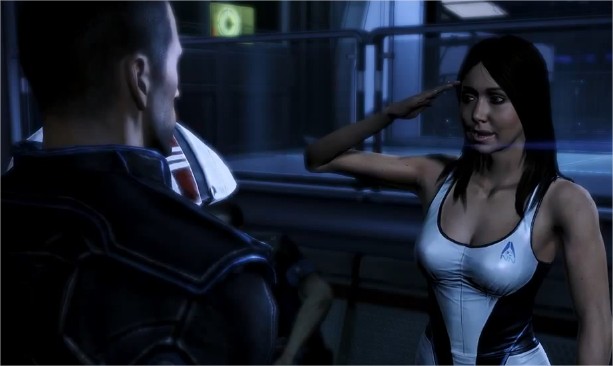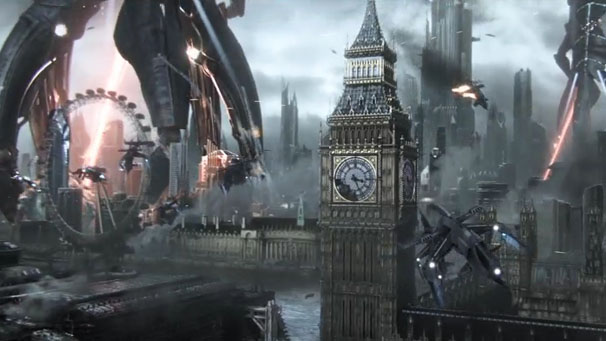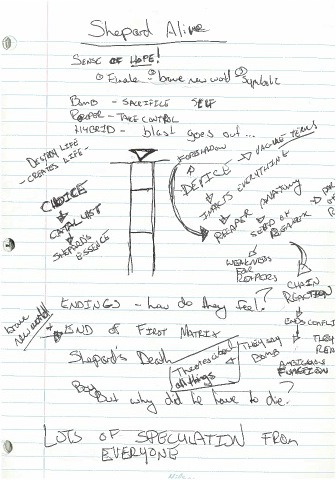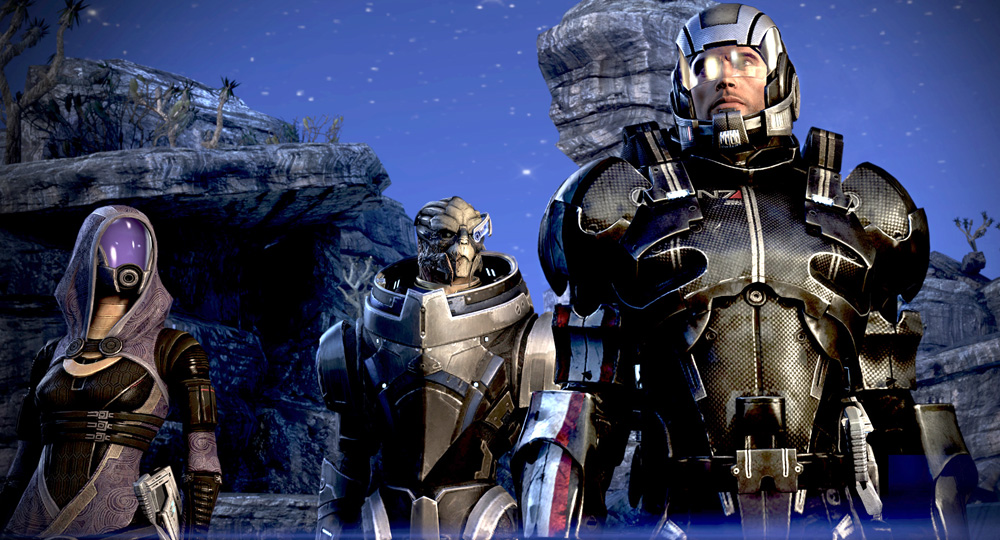BioWare can’t win. Well, as much as shipping 1.3 million copies of a game in the first month of release can be seen as a loss.
While highly praised by critics and many fans, Mass Effect 3 looks to be remembered most for a controversial ending and sthe ubsequent fan uproar. More than that, the final showdown between Commander Shepard and the Reapers seems like a schoolgirl slap-fight compared to the dissenting opinions on consumer demand and creative control, especially in a medium that’s already fighting hard to be taken seriously as art.
Whatever that means.
Please note: this article contains no major spoilers. There’s tons of easily available articles elsewhere about what’s wrong with the Mass Effect 3 ending. This isn’t about the specifics. This is about what happens after.
When you buy a role-playing game such as Mass Effect, where the fate of galaxies, races, and individuals depend upon your choices, do you have a right to ask for more choices when the ones provided don’t meet your standards? Is BioWare being weak or business-savvy by addressing concerns about the game’s ending with just-announced downloadable content available in a few months’ time?
Just because a video game can be changed in such a way, should it? We buy directors’ cuts of movies and read authors’ definitive editions of novels. But creating video games is less of a solitary endeavor than writing and few titles have just one person at the helm. It’s not “Casey Hudson’s Mass Effect 3,” after all. (Hudson is the project director of the Mass Effect series.)

At any rate, Casey Hudson’s Mass Effect 3 experience was probably nothing like mine because few players have completely identical playthroughs. In my 100+ hours spent as Commander Jane Shepard (with the aquiline nose, gamine haircut, and eyeshadow to match her N7 armor) I forged my own path through a staggering amount of dialogue trees and irreversible actions. I chose for Shepard as I would choose for myself. Even down to telling inappropriately dressed Game Informer reporters to piss off. Well, I might not be brave enough to headbutt a krogan. But playing as Commander Shepard gives you license for a bit of wish fulfillment, no?
And maybe that’s why so many fans took the ending so personally.
Okay, I lied. Here’s some spoilers for Mass Effect 3 that one can skip over if one so chooses:
My personal, immediate reaction to the ending I was forced to pick was confusion and extreme frustration. The ending didn’t satisfy me on any level. Especially compared to the emotional closure I felt earlier in the game when I cured the genophage and negotiated peace between the Quarians and the Geth. That was extremely well-done drama in any medium.
The very last ten minutes of a 100+ hour game shouldn’t matter so much, but they did. At least when the finales of Lost and Battlestar Galactica let me down, I wasn’t shocked because the last seasons were uneven. The Mass Effect 3 ending was intellectually flimsy, abrupt, and failed to make the hours of preceding drama resonate in any meaningful way to my squadmates or to me as a player. Which is the biggest failure of all.

I wasn’t expecting an 80s-style montage of “Where is Garrus/Tali/Joker now?” But I was expecting more from a final take-away image than a pop-up text telling me “Commander Shepard has become a legend by ending the Reaper threat. Now you can continue to build that legend through further gameplay and downloadable content.”
That’s not showing me that my character has become a legend. That’s telling me to be sure to drink my Ovaltine.
I was also not expecting Commander Shepard to live. While Mass Effect is a wildly fun series, it’s not as original as some may claim it to be and dismissing critics of the ending as crybabies who only want to see adorable baby asari and roses is a failure to do detailed research on people’s actual complaints. Mass Effect is a gorgeous pastiche. So why would I expect the savior of the universe to not sacrifice her own life for the greater good in a tale as old as savior stories? Jesus was an OP. (Original Paragon.)
Spoiler-territory cleared.
BioWare committed a cardinal sin of role-playing games: don’t force all players into a definitive final choice. And more specific to Mass Effect, don’t promise players that they will get to see the consequences of their choices and then fail to deliver. In the age of YouTube, players can easily compare all outcomes and see that, on the surface, all three possible outcomes are nearly identical. There is some argument against this and I’m willing to cede some points in the name of suspension of belief, but it still doesn’t change the final cutscenes’ similarity.

The feeling of real betrayal is stronger in some people than in others. My initial anger gradually cooled down to disappointment—what a missed opportunity to go for those heartstrings one last time and deliver an epic ending to such a blockbuster series! I’m still not certain how long it will take me to replay the game. Yet, while I agree with the outrage (and I do believe it’s more than a small and vocal online community) I can’t defend the actions of some protesting fans. I find the use of tying customer demands with donations to juvenile cancer charity Child’s Play extremely distasteful. If only being a really cool cancer charity alone was enough to raise $80,000 in a few days.
 There was no easy answer for BioWare. Caving into the pressure of unhappy fans is admitting they failed. A game gives the illusion of action and accomplishment, but most every event in a game is scripted by someone. There’s even proof that BioWare wanted an ending with a lot of speculation. Which I guess is code for a big ol’ sloppy mess of follow-up questions. But BioWare should be lauded for not throwing their writers on the fire and standing behind their artistic vision, however misguided it may be.
There was no easy answer for BioWare. Caving into the pressure of unhappy fans is admitting they failed. A game gives the illusion of action and accomplishment, but most every event in a game is scripted by someone. There’s even proof that BioWare wanted an ending with a lot of speculation. Which I guess is code for a big ol’ sloppy mess of follow-up questions. But BioWare should be lauded for not throwing their writers on the fire and standing behind their artistic vision, however misguided it may be.
The “extended cut” of Mass Effect 3 is at least a free add-on, so kudos to BioWare for getting that right. They could have charged for it, but then I suspect the gaming community would have collapsed from the weight of its own indignation. So they have listened to fans. But BioWare is not giving players new choices at the end, they are just adding on more cinematics post-final decision to offer more clarity. (Will I learn how my squad for the Earth mission returned to the Normandy?)
But I already played through the final mission of Mass Effect 3, accepted my disappointment and nursed some stiff drinks through my own emergency induction port. And I moved on. Adding new cutscenes to the end-game won’t change my initial experience, though I will watch out of curiosity. They can’t give me the legacy I have already imagined for my own Commander Shepard in the month since I finished the game.
BioWare hopes the new DLC will provide unhappy gamers with a sense of closure, but that will surely prove to be as impossible—and personal—to define as art.
Theresa DeLucci is a regular contributor to Tor.com. She covers True Blood, Game of Thrones, and is also an avid gamer. She has also covered tech and TV for Geektress.com and Action Flick Chick. Follower her on Twitter @tdelucci










